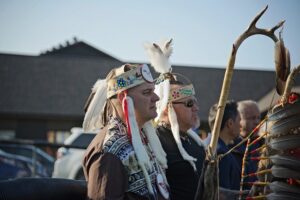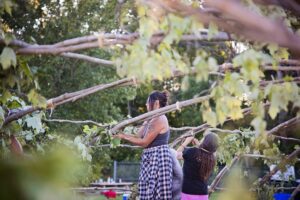Treaty Gathering hears importance of renewal of relationship

By Kelly Anne Smith
GARDEN VILLAGE — Nipissing First Nation and Dokis First Nation hosted the Robinson Huron Treaty of 1850 Treaty Gathering 2022, themed Restoring the Balance, on September 7-9 at the teaching lodge and the Home of the Nipissing Warriors rink.
Dokis First Nation Chief Gerry Duquette Jr. highlighted the greatness of everyone being together at the Sunrise and Water Ceremonies in the teaching lodge. Nipissing First Nation Chief Scott McLeod added he had never seen so many people in the lodge and it was a good feeling.
Chief McLeod then talked of the dark storm that formed over his people when the Robinson Huron Treaty of 1850 was signed.
“Our people suffered greatly; some people died during that process. The fire may have lost its flame but underneath there was still glowing embers that could not be extinguished. Here we are 172 years later and the sun is shining and we are all gathering again. And those flames are starting to come back out of that fire,” he explains. “Now we get to build that fire back up. We get to teach our kids about what Treaty really means because I don’t think we really understand it yet. And I know this because I hear our people talk. They talk about hunting and fishing and they talk about the land. They refer to it as Treaty rights, but we don’t have Treaty rights… I say that because we didn’t get our rights from a treaty. We did not get our rights from a colonial government – from the Crown – they didn’t give us anything. We always had it. It belongs to us. Our rights are inherent rights.”
In 2010, the Robinson Huron Treaty Litigation Fund was formed by 21 Lake Huron First Nations to pursue litigation and/or negotiations against Canada and Ontario for failing to increase annuities payments since 1874. Chairman Mike Restoule virtually addressed the gathering saying Elders spoke to the court about what the Anishinabek understanding of the Treaty was.
“They told the judge (Restoule v. Canada) that there are certain things that Anishinaabe people understand about a relationship. A relationship in a treaty is extremely important. A treaty means that two nations of people agree to live together in peace. We become allies. We become friends. We become relations,” he explains. “Justice Hennessy was told there are four very important relationship principles to keep in mind so the Treaty should never be forgotten. Those relationship principles are: respect, reciprocity, responsibility, and renewal. Since 1850, the other Treaty partner began to forget about the Treaty… They began to lose respect for us, they didn’t practice reciprocity, they didn’t own up to their responsibility, they didn’t own up to renewal of the relationship between us, and that’s why we have suffered so much.”
Restoule says the Robinson Huron Treaty Litigation is a fight for justice.
“We were always ready, right from the start, to sit down and negotiate a peaceful joint settlement on our case that is respectful, that exercises reciprocity, that exercises responsibility and renewal,” he adds. “So today, our Treaty Gathering is based on that relationship. And we our renewing the Treaty.”
On Thursday, Nelson Toulouse of Sagamok Anishnawbek First Nation announced the Queen of England had passed on. As Martina Osawamick gave words of prayer, the gathering rose for two minutes of silence.
“She was our Treaty partner, Elizabeth was,” Toulouse said. “Now we will be dealing with Charles, King Charles.”
A talk was given by Professor Dr. Deborah McGregor extolling earth-based laws and governance. McGregor sees the Pipe and the Eagle Story as a climate change story because people aren’t living up to the obligation of caring for the earth. She urges us to not do damage in nature and learn from the earth.
“A lot of the answers are in our own laws, our own knowledge, and our own governance,” she insists.
The Traditional Elders Knowledge Group or TEK launched the White Ribbon Campaign to bring awareness to the damage caused to trees with Ontario spraying glyphosate to kill underbrush.
“It’s taking direct action and wrapping a white ribbon around trees. This is to tell everybody to wake up. We invite everybody to join us. There is a TEK or Traditional Elders Knowledge gathering in Elliot Lake on October 6th, a Friday afternoon and Saturday all day, October 7th,” Nelson Toulouse explains. “The White Ribbon Campaign is something we can do in our respective areas where we come from so the white ribbons are seen by the non-Indigenous peoples in particular and that they ask questions or at least be reminded of our relationship.”

Speaker Dr. Heidi Bohoker works to tell truths about Indigenous history. Bohoker explained how chiefs would send pipes, often with letters, to Ottawa to the Governors General, to remind them of their Treaty obligations.
Peter Beaucage of Nipissing First Nation gave a teaching on semaa (tobacco).
“When you use that semaa, those spirits all come to check out your semaa and see how they can help you. That is the belief of an Anishinaabe.”
Beaucage is concerned with people of all ages using opiates. He told of coming to the crossroads of addiction in 1979 and has never put mood-altering substances in his body since.
“Help ourselves. That’s what we need to do. Listen to the Elders encouraging us to pick up semaa and to identify yourselves as Anishinaabe. Everyone of you are teachers and healers. Semaa will show you the way. You need to believe in yourself that you can do that.”
September 9 is the anniversary of the signing of the Treaty. The Treaty gathering continued with discussions and activities through the day. A Sweat Lodge was available for the gathering.
The Supreme Court of Canada hearing date is expected before June 23, 2023, with a decision about six months later.
For further information: http://waawiindamaagewin.com/


